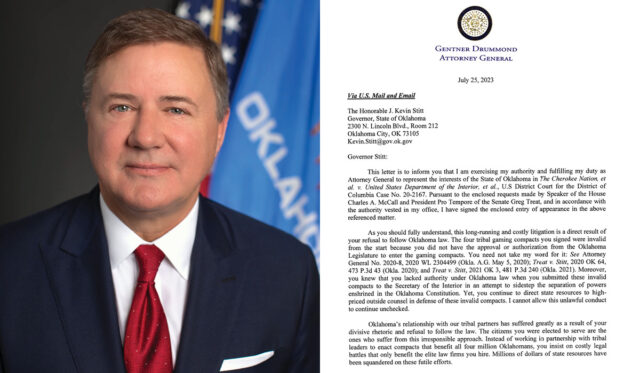
Going against the wishes of Gov. Kevin Stitt, whom he claims is betraying his duties to the state and wasting taxpayer money on private law firms, Oklahoma Attorney General Gentner Drummond announced today that he is entering a federal lawsuit filed against the U.S. Department of Interior, four tribal nations and Stitt, who signed and submitted new casino gaming compacts with the four tribes three years ago.
In his notice of appearance filed in U.S. District Court for the District of Columbia, Drummond said he is “compelled to take this extraordinary action to put an end to the governor’s betrayal of his duty to ’cause the laws of the state to be faithfully executed.'” According to a release from Drummond, the governor’s office has spent nearly $600,000 defending the compacts, which the Oklahoma Supreme Court ruled were illegal after they had been submitted to and deemed federally approved by the U.S. Department of Interior in 2020.
“It is my hope that you will acknowledge my exercise of statutory duties as an opportunity to discontinue state expenditures for costly outside counsel who continue to defend these indefensible compacts,” Drummond wrote to Stitt in a letter Tuesday. “Regardless of what actions you may take in this matter, I will faithfully fulfill my duty to uphold the law and act in the best interests of the state.”
Drummond said in a statement the compacts the governor signed with the Comanche Nation, the Otoe-Missouria Tribe, the United Keetoowah Band of Cherokee Indians, and the Kialegee Tribal Town are invalid because he signed the compacts without first getting legislative approval for expanded types of gaming listed within them, including sports betting.
The Oklahoma Supreme Court ruled that to be the case in July 2020 and January 2021 after legislative leaders challenged the compacts in court. But because Stitt had submitted the compacts to the U.S. Department of Interior for federal review — and because the agency deemed them approved by taking no action to disapprove them within 45 days — the Cherokee Nation, Chickasaw Nation, Citizen Potawatomi Nation and the Choctaw Nation filed litigation in federal court. (The compacts signed by Stitt with the four smaller tribes specified new casino opportunities near those tribes’ existing casino interests.)
“While Gov. Stitt and I are both elected Republican leaders who agree on many issues, I have been highly critical of his dealings with our Native American tribes,” Drummond said. “The governor is free to make his own decisions regarding how he wants to interact with the tribes, but he is not free to violate Oklahoma law. I am taking this action in order to uphold the law and defend our constitution.”
Drummond’s decision to enter the federal lawsuit on behalf of the state comes one day after the Oklahoma State Senate voted to override Stitt’s veto of SB 26X, which proposes extending all existing state-tribal compacts on tobacco taxation by one year. The House is expected to vote on overriding the measure Monday.
And Drummond’s decision comes a month after he wrote to legislative leaders seeking formal direction to take up the federal case. Stitt’s general counsel, Trevor Pemberton, wrote a July 11 letter to legislative leaders saying the attorney general lacked the authority to represent Stitt in the case.
However, Senate President Pro Tempore Greg Treat (R-OKC) responded last week to Drummond’s request with a letter that said “please consider this my formal request (…) on behalf of the Oklahoma State Senate to assume control of the defense of the state’s interest in Cherokee Nation, et al. v. DOI, et al. with all required speed and diligence.”
House Speaker Charles McCall, (R-Atoka) in a June 26 response to Drummond, also said he believes the attorney general has “unilateral authority to take over the litigation.”
In his federal court notice of appearance, Drummond mentioned the legislative leaders’ requests on behalf of their respective caucuses to “assume the control and defense of the state’s interests in this case.” Drummond said “there is no question” that Oklahoma law provides he is the proper person to represent the state’s interests in the case.
Drummond also cited a federal case, Will v. Michigan Department of State Police, that he has the authority to represent Stitt in the lawsuit because the lawsuit against the governor is in his official capacity as governor: “[A] suit against a state official in his or her official capacity is not a suit against the official but rather against the official’s office … [a]s such, it is no different from a suit against the state itself.”
Reaction to Drummond entering the federal lawsuit
In response to Drummond’s decision to enter the case, a Stitt spokeswoman criticized the attorney general.
“General Drummond, in an unprecedented move, is turning his back on four tribes who have been sued by Oklahoma’s wealthiest tribes,” Abegail Cave, Stitt’s communications director, said in a statement. “Drummond continues to work with these wealthy tribes as they use Oklahoma political officials to further their agenda. Gov. Stitt is actively fighting for eastern Oklahoma as these tribes continue their efforts to turn Tulsa and much of the rest of eastern Oklahoma into a reservation.”
Treat, who in his letter to Drummond wrote that Stitt “refuses to respect Oklahoma law and the constitutional restraints on his power,” disagreed. In a statement, he said he appreciates Drummond’s “dedication to the rule of law” and his willingness to intervene in the case.
“His involvement is our best and most expeditious path forward,” Treat said. “The governor has wasted untold amounts of taxpayer money on these lawsuits that have been an abject failure. Continuing them does nothing but alienate our tribal partners and undermine the very goals that the governor says he’s trying to achieve.
“I am hopeful that with the [attorney general’s] warranted intervention and recent legislative action that Oklahoma can start to move down a more effective pathway.”
Cherokee Nation Principal Chief Chuck Hoskin Jr. said his tribe filed the federal litigation to protect tribal sovereignty.
“The Cherokee Nation — alongside the Chickasaw Nation, Choctaw Nation and Citizen Potawatomi Nation — has been in federal court to ensure the law is properly followed and tribal sovereignty is respected,” Hoskin said in a statement. “I welcome the entry of Attorney General Drummond into this case, and the continued engagement of any state officials who are dedicated to seeing the law followed where these illegal compacts are concerned.”
Drummond said he informed the governor of his decision in a personal phone call and an official letter.
“As you should fully understand, this long-running and costly litigation is a direct result of your refusal to follow Oklahoma law,” Drummond wrote to Stitt. “The four tribal gaming compacts you signed were invalid from the start because you did not have the approval or authorization from the Oklahoma Legislature to enter the gaming compacts.”
Drummond further excoriated Stitt in the letter.
“Oklahoma’s relationship with our tribal partners has suffered greatly as a result of your divisive rhetoric and refusal to follow the law,” he wrote. “The citizens you were elected to serve are the ones who suffer from this irresponsible approach. Instead of working in partnership with tribal leaders to enact compacts that benefit all 4 million Oklahomans, you insist on costly legal battles that only benefit the elite law firms you hire. Millions of dollars of state resources have been squandered on these futile efforts.”
Drummond aware he has made ‘an extraordinary act’
In the federal gaming compact lawsuit filed in August 2020, the Cherokee, Chickasaw, Choctaw and Citizen Potawatomie nations argue that the U.S. Department of the Interior should have invalidated Stitt’s new compacts with the Comanche Nation, the Otoe-Missouria, the United Keetoowah Band of Cherokee Indians and the Kialegee Tribal Town.
Prior to Drummond’s entry Tuesday, the case’s most recent filings had concerned a “notice of recent authority” submitted on July 12 by an assistant U.S. attorney general. The notice involved a June 30 decision from the D.C. Court of Appeals about a Seminole Tribe of Florida compact that the Department of the Interior deemed approved in 2021 that included operation of online sports betting. The appellate court overturned a district court ruling and determined the compact is valid, noting that it complied with the federal Indian Gaming Regulatory Act.
Department of Interior attorneys submitted notice of the ruling in the Cherokee Nation case against the federal agency and Stitt because the parties had “cited the now-overruled District Court opinion in briefing plaintiffs’ pending motion to compel.”
“Among other things, the D.C. Circuit held that ‘whether or not that gaming is authorized or permissible as a matter of Florida state law falls outside the scope of the Secretary [of the Interior’s] review,’” the Department of the Interior’s attorneys wrote July 12.
The plaintiff tribes responded July 21, calling the filing “paltry” and saying the other court ruling was “no help to federal defendants in this case.”
Drummond, in his appearance letter to the U.S. District Court for the District of Columbia, said he is “mindful that it is an extraordinary act” for an Oklahoma attorney general to exercise state law to assume control of litigation being defended by the governor.
“I do not take this action lightly,” he wrote. “However, I see no other option because the governor has inexplicably abrogated his constitutional duties in this case.”
Read Drummond’s letter to Stitt and its attachments
